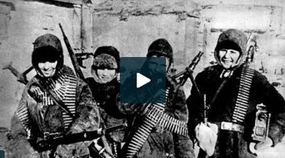Zog nit keynmol Jewish Partisans Tribute Warsaw Ghetto Uprising 1943
Lyrics - Hirsh Glick (1922 Vilna, Lithuania – 1944 Estonia) Music - Dmitri Pokrass (1899 Kiev -1978Moscow)
Singer - Paul Robison

Zog nit keyn mol, az du geyst dem letstn veg - Never say this is the final road for you.
These words are derived from the first line of the song "Zog nit keynmol". In 1943, the lyrics for this song was written by Hirsh Glick. He was being held in the Vilna (Lithuania) Ghetto, during Nazi occupation. The news from the 1943 Warsaw Ghetto uprising inspired Hirsch to write the lyrics. In 1937, Dmitry and Daniel Pokrass wrote the song "Terek Cossacks". Hirsh uses the melody for his lyrics. "Zog nit keynmol" became a symbol of defiance against Nazi murderers of the Jews, the Holocaust and The Warsaw Ghetto uprising. Jewish partisan fighters from The Warsaw Ghetto, Naliboki forest, Minsk Ghetto, Lodz Ghetto... sang this song to fortify their courage, and to celebrate "their victories" against the Nazis.
Glick attempted to escape from the Vilno Ghetto, however, he got re-captured and put near Riga (Estonia) in a concentration camp where he got executed.
This song made a big splash in 1949 during a Paul Robison visit to the USSR. Historian and Robeson biographer Martin Duberman writes in his book “Paul Robison biography”
Robeson spoke during his concert in Tchaikovsky Hal on June 14, about his close friendship with Feffer and the recently deceased actor Solomon Mikhoels prior to singing the Vilna Partisan song "Zog Nit Keynmol" in both Russian and Yiddish. The concert was being broadcast across the entire Soviet Union. "Asking the audience for silence he announced that there would be only one encore for that evening. He then spoke of his deep cultural ties between the Jewish peoples of the Soviet Union and the United States, and of how that tradition was being continued by the present generation of Russian-Jewish writers and actors. He then referred to his own friendship with Mikhoels and Feffer, and spoke of his great joy in having just come from meeting with Fefffer again. Robeson then sang in Yiddish, to a hushed hall, "Zog Nit Keynmol," the Warsaw Ghetto resistance song, first reciting the words in Russian:
"'Never say that you have reached the very end
When leaden skies a bitter future may portend;
For sure the hour for which we yearn will yet arrive
And our marching steps will thunder: 'we survive'.
After a moment's silence, the stunned audience, Great Russians and Jews alike responded with a burst of emotion, people with tears in their eyes coming up to the stage, calling out "Pavel Vaslyevich," reaching out to touch him.[aving made that public gesture in behalf of Feefer and other victims of Stalin's policies-all that could have been done without
directly threatening Feffers's life-Robeson clammed up on returning to the United States."[Robeson's spontaneous translation of the Yiddish text of the song of the Warsaw Ghetto Uprising into Russian and his personal tribute to Mikhoels and Feffer were censored from the tapes of the 1949 broadcast.
These words are derived from the first line of the song "Zog nit keynmol". In 1943, the lyrics for this song was written by Hirsh Glick. He was being held in the Vilna (Lithuania) Ghetto, during Nazi occupation. The news from the 1943 Warsaw Ghetto uprising inspired Hirsch to write the lyrics. In 1937, Dmitry and Daniel Pokrass wrote the song "Terek Cossacks". Hirsh uses the melody for his lyrics. "Zog nit keynmol" became a symbol of defiance against Nazi murderers of the Jews, the Holocaust and The Warsaw Ghetto uprising. Jewish partisan fighters from The Warsaw Ghetto, Naliboki forest, Minsk Ghetto, Lodz Ghetto... sang this song to fortify their courage, and to celebrate "their victories" against the Nazis.
Glick attempted to escape from the Vilno Ghetto, however, he got re-captured and put near Riga (Estonia) in a concentration camp where he got executed.
This song made a big splash in 1949 during a Paul Robison visit to the USSR. Historian and Robeson biographer Martin Duberman writes in his book “Paul Robison biography”
Robeson spoke during his concert in Tchaikovsky Hal on June 14, about his close friendship with Feffer and the recently deceased actor Solomon Mikhoels prior to singing the Vilna Partisan song "Zog Nit Keynmol" in both Russian and Yiddish. The concert was being broadcast across the entire Soviet Union. "Asking the audience for silence he announced that there would be only one encore for that evening. He then spoke of his deep cultural ties between the Jewish peoples of the Soviet Union and the United States, and of how that tradition was being continued by the present generation of Russian-Jewish writers and actors. He then referred to his own friendship with Mikhoels and Feffer, and spoke of his great joy in having just come from meeting with Fefffer again. Robeson then sang in Yiddish, to a hushed hall, "Zog Nit Keynmol," the Warsaw Ghetto resistance song, first reciting the words in Russian:
"'Never say that you have reached the very end
When leaden skies a bitter future may portend;
For sure the hour for which we yearn will yet arrive
And our marching steps will thunder: 'we survive'.
After a moment's silence, the stunned audience, Great Russians and Jews alike responded with a burst of emotion, people with tears in their eyes coming up to the stage, calling out "Pavel Vaslyevich," reaching out to touch him.[aving made that public gesture in behalf of Feefer and other victims of Stalin's policies-all that could have been done without
directly threatening Feffers's life-Robeson clammed up on returning to the United States."[Robeson's spontaneous translation of the Yiddish text of the song of the Warsaw Ghetto Uprising into Russian and his personal tribute to Mikhoels and Feffer were censored from the tapes of the 1949 broadcast.
Yidish
|
English
|